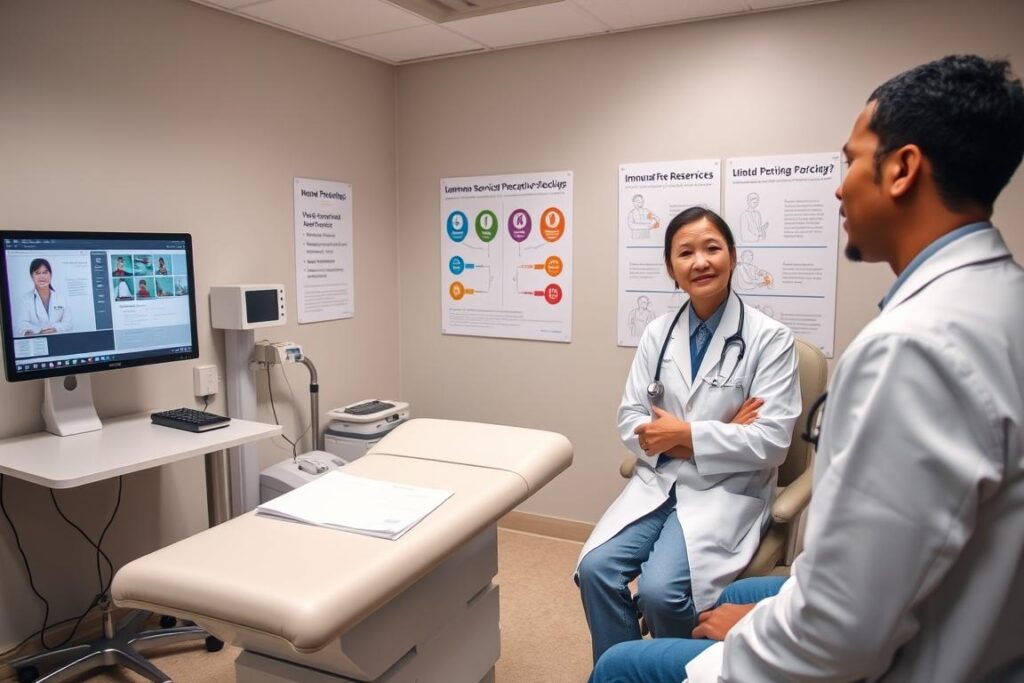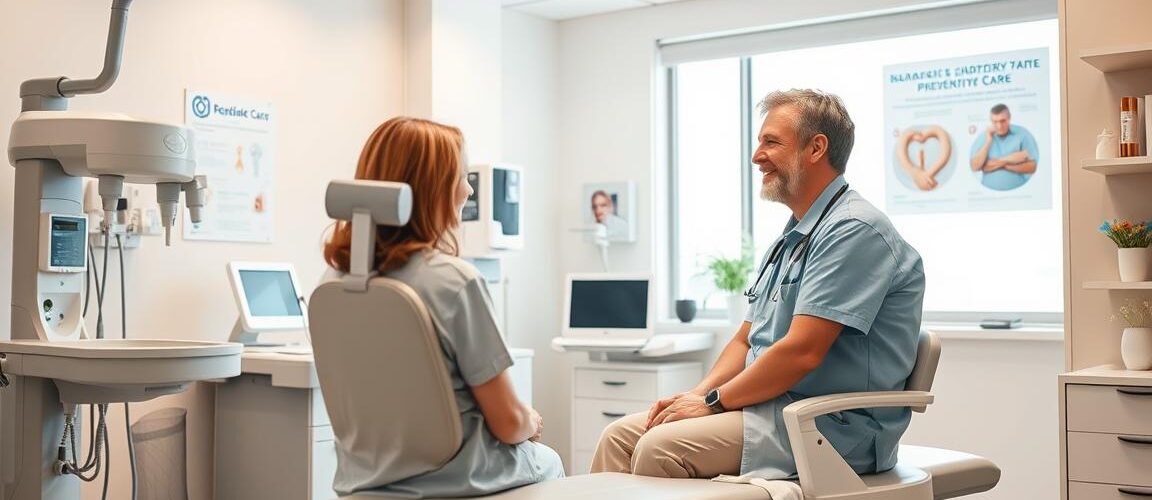Starting a healthy lifestyle is all about routine screenings and caring for your health every day. By adding preventive steps to our daily routines, we can lower the chance of getting chronic diseases. This helps us feel better overall.
Experts say it’s important to catch and manage chronic conditions early. This way, we can take steps to live a healthier life. Preventive Care is a big part of this effort.
Key Takeaways
- Regular health screenings are key for catching health problems early.
- Adding health care to our daily routines boosts our overall health.
- Preventive steps can greatly cut down the risk of chronic diseases.
- Being proactive about our health is essential for a healthier life.
- Prevention is a critical part of healthcare.
What is Preventive Care?
Preventive care is about stopping diseases before they start. It’s all about keeping our health in top shape.
It’s key to staying healthy and avoiding long-term illnesses. Regular wellness visits and preventive health services help catch problems early.
Definition and Importance
Preventive care is very important. It helps us avoid serious health problems. It also makes our lives better and can save money on healthcare.
Types of Preventive Care Services
There are many types of preventive care. These include routine tests, health checks, and medicine to prevent diseases. They meet the needs of all ages and health levels.
Important services include tests for diseases like diabetes and high blood pressure. There are also shots to protect against infections. Plus, regular health checks and advice help keep us healthy.
| Service Type | Description | Benefit |
|---|---|---|
| Routine Screenings | Tests for early detection of diseases | Early intervention and treatment |
| Immunizations | Vaccinations against infectious diseases | Prevention of outbreaks and protection of vulnerable populations |
| Health Maintenance | Regular check-ups and health counseling | Promotion of healthy lifestyles and disease prevention |
Benefits of Preventive Care
Preventive care boosts our health and well-being. It includes services and practices to prevent illnesses and detect problems early. This helps keep us healthy over time.
Preventive care improves our health outcomes. By adding preventive measures to our lives, we lower the risk of chronic diseases. Preventive health check-ups and screenings help find health issues early. This makes treatment easier.
Improved Health Outcomes
Preventive care is key to better health outcomes. It finds health problems early, when they’re easier to handle. Regular health checks and screenings help doctors catch issues before they get worse.
- Early detection of health issues
- Reduced risk of chronic diseases
- Better management of health conditions
Cost-Effectiveness of Preventive Care
Preventive care is also cost-effective. It prevents or catches health problems early, saving money on future treatments. Preventative healthcare like vaccinations and screenings are cheaper than treating advanced diseases. This saves money for both individuals and the healthcare system.
| Cost Comparison | Preventive Care | Treatment of Advanced Diseases |
|---|---|---|
| Average Cost | $100-$500 | $1,000-$10,000+ |
| Long-term Benefits | Reduced risk of chronic diseases | Limited benefits, often focused on managing symptoms |
In conclusion, preventive care offers many benefits. It improves our health and saves money. By taking preventive measures and getting regular health check-ups, we can control our health and well-being.
Common Preventive Care Services
Preventive care is key to our health and well-being. It includes many services to stop illnesses and find health problems early. By using these services, we can greatly improve our health and life quality.
There are many types of preventive care services. They help us stay healthy and prevent illnesses. These services are proactive, not just reacting to problems.
Screening Tests
Screening tests are vital for preventive care. They find health problems early, when they’re easier to treat. Some common tests include:
- Blood pressure screenings to detect hypertension
- Cholesterol screenings to detect high cholesterol
- Diabetes screenings to detect diabetes
- Cancer screenings, such as mammograms and colonoscopies
These tests can spot health issues before symptoms show. This allows for early treatment.
Immunizations
Immunizations are also key in preventive care. They protect us from diseases like flu, pneumonia, and HPV. Keeping up with our immunizations lowers our risk of getting these diseases.
Some common immunizations include:
- Flu shots
- Pneumonia vaccines
- HPV vaccines
- COVID-19 vaccines
Regular Check-Ups
Regular check-ups with our primary care provider are also vital. During these visits, our provider can:
- Monitor our health and detect any issues early
- Give advice on healthy habits and lifestyle choices
- Update our immunizations and screenings as needed
By keeping up with regular check-ups, we ensure we get the care we need to stay healthy.
| Preventive Care Service | Description | Benefits |
|---|---|---|
| Screening Tests | Blood pressure, cholesterol, diabetes, and cancer screenings | Early detection and treatment of health problems |
| Immunizations | Flu shots, pneumonia vaccines, HPV vaccines, and COVID-19 vaccines | Protection from infectious diseases |
| Regular Check-Ups | Monitoring health, guidance on healthy habits, and updating immunizations and screenings | Maintaining overall health and well-being |

The Role of Nutrition in Preventive Care
Eating well is key to staying healthy. It’s a big part of health maintenance and preventive medicine. It helps us live a healthier life.
When we eat foods full of good nutrients, we lower our risk of getting sick. This is important for our health and happiness. As our article on building a strong immune system shows, a balanced diet is essential.
Essential Nutrients for Health
Fruits, veggies, whole grains, and lean proteins are must-haves for our health. They give our bodies what they need to work right. This helps our immune system and keeps us feeling good.
- Fruits and vegetables provide vital vitamins and minerals.
- Whole grains offer fiber and essential nutrients.
- Lean proteins support muscle health and satisfaction.
Healthy Eating Habits
Good eating habits are important for wellness visits and health. We should avoid too much of processed foods and sugar. They’re not good for us.
By eating healthy, we keep ourselves well and avoid health issues. It’s about making choices that help us stay healthy.
Exercise as a Preventive Measure
Exercise is a key part of keeping healthy. It helps us stay at a good weight, lowers the risk of serious diseases, and boosts our mood. Adding exercise to our daily routine can greatly improve our health and life quality.
Recommended Physical Activities
Doing different physical activities can be fun and good for us. Some great exercises include:
- Brisk Walking: It’s easy to do every day, and you can walk almost anywhere.
- Cycling: It’s good for your heart, whether you’re on a bike at home or outside.
- Swimming: It’s easy on your joints, making it perfect for those with mobility issues.
Tips for Staying Active
To keep exercise a regular part of our lives, try these tips:
| Tip | Description | Benefit |
|---|---|---|
| Find Enjoyable Activities | Choose exercises you like, so you’ll keep doing them. | More likely to stick with your routine |
| Schedule Exercise | Make exercise a must-do part of your day. | Stay consistent with your workouts |
| Start Slow | Begin with something you can handle, then get harder over time. | Less chance of getting hurt or getting tired |
By using these tips and adding physical activity to our daily lives, we can enjoy the benefits of exercise. It helps us stay healthy and feel good.
Mental Health and Preventive Care
It’s key to focus on our mental health as much as our physical health. Mental health is a big part of our overall health. Ignoring it can really hurt our quality of life.
Mental health screenings are a big part of preventive care. They help find and treat mental health problems early. This can stop bigger issues from happening.
Importance of Mental Health Screenings
Mental health screenings are vital for spotting problems like depression and anxiety early. This lets us start treatment sooner. Regular screenings also help talk more openly about mental health.
Early detection through screenings can lead to better health outcomes. For example, catching depression early can stop it from ruining our daily lives and relationships.
Strategies for Mental Well-Being
Along with screenings, it’s important to add mental well-being strategies to our daily lives. This includes mindfulness, stress management, and self-care. Mindfulness helps us stay in the moment and worry less about the past or future. Stress management, like meditation or deep breathing, can really cut down stress.
Doing things we love and that make us happy is also key. Whether it’s reading, exercising, or hanging out with family, making time for these activities boosts our mental health.
By mixing regular mental health screenings with strategies for mental well-being, we can take a proactive step for our mental health. This all-around approach to preventive care makes sure we’re taking care of our health in every way.
How to Incorporate Preventive Care into Your Life
By focusing on preventive care, we can control our health and lower the risk of chronic diseases. It’s easy and effective to add preventive steps to our daily lives. One important step is to stay organized and proactive about our health.
Create a Health Checklist
Making a health checklist helps us keep up with our health and make sure we don’t miss important screenings. This list should include routine tests, vaccinations, and health checks based on our age, gender, and health history.
For example, a health checklist might include:
- Annual physical exams
- Recommended vaccinations (e.g., flu, HPV, COVID-19)
- Screenings for blood pressure, cholesterol, and diabetes
- Cancer screenings (e.g., mammograms, colonoscopies)
Schedule Regular Appointments
It’s important to schedule regular visits with our healthcare provider. These visits help catch health problems early and let us talk about any concerns or questions.
Also, spending time with loved ones, as studies show, can boost our mental and physical health. By combining regular health visits with a strong support network, we can improve our overall well-being.
| Age Group | Recommended Screenings | Frequency |
|---|---|---|
| 20-39 years | Blood pressure, cholesterol | Every 2-5 years |
| 40-64 years | Blood pressure, cholesterol, diabetes screening | Every 1-3 years |
| 65 years and older | Blood pressure, cholesterol, diabetes screening, cancer screenings | Annually or as recommended |
For more tips on managing stress, a key part of preventive care, visit https://prosperglow.com/stress-management-techniques-to-prevent-chronic-diseases/.
Preventive Care Across Different Ages
Preventive care is key for health at all ages. It’s not just one thing, but a journey that changes as we grow. It helps prevent diseases, finds health problems early, and encourages healthy living.
Pediatric Preventive Care
Pediatric care lays the foundation for lifelong health. It includes regular check-ups, shots, and tests for growth and development. These visits help doctors track a child’s health and offer tips on nutrition and safety.
Vaccines are very important. They help stop serious diseases that can harm a child’s health.
Adult Preventive Care
Adult care focuses on keeping healthy and avoiding chronic diseases. It includes screenings for blood pressure, cholesterol, and cancer, plus advice on diet and exercise. Regular visits help catch and manage risks for diseases like diabetes and heart disease.
For more on adult care, visit Prosper Glow.
Senior Preventive Care
Senior care is vital for managing health issues and staying independent. It includes regular check-ups, screenings for conditions like osteoporosis, and monitoring for depression or cognitive decline. It also focuses on preventing falls, managing medications, and getting the right vaccinations.
Preventive care is essential at every age. It’s about making smart choices and working with doctors to keep healthy. Let’s take care of our health at every stage of life.
Challenges in Accessing Preventive Care
Preventive care is key to staying healthy, but many struggle to get it. Issues like money, where you live, and not knowing about services are big hurdles.
Healthcare Disparities
Healthcare gaps block many from getting preventive care. Disparities in healthcare come from income, education, and ethnicity. For example, those with less money often can’t get health insurance or see doctors as easily.
- Limited access to healthcare providers in rural or underserved areas
- Lack of health insurance or inadequate coverage
- Language barriers for those who are not proficient in English
- Cultural barriers that affect the utilization of healthcare services

Overcoming Barriers to Access
To beat these barriers, we need smart strategies. Increasing awareness about preventive care’s value is key. Also, making health insurance cheaper and starting programs for free or low-cost services can help.
- Enhancing health literacy among the population to understand the benefits of preventive care
- Expanding health insurance coverage to include more preventive care services
- Improving access to healthcare providers through telehealth services, for those in remote or underserved areas
Future of Preventive Care
Modern healthcare is getting more complex, but preventive care is looking bright. New tech and telehealth are leading the way. These tools make health checks better and easier to get.
Advances in Medical Technology
New tech is changing how we prevent health issues. Artificial intelligence and data analytics help doctors give better care. They tailor health checks to fit each person’s needs.
Telehealth: Expanding Access to Preventive Services
Telehealth services, like those from Palm Primary Care Texas, are key. They offer virtual visits and monitoring. This lets us stay healthy from anywhere. For more on health management, check out dietary strategies for managing health conditions.
By using these new tools, we can make health care better. We aim for a future where health checks are easy and effective for all.



